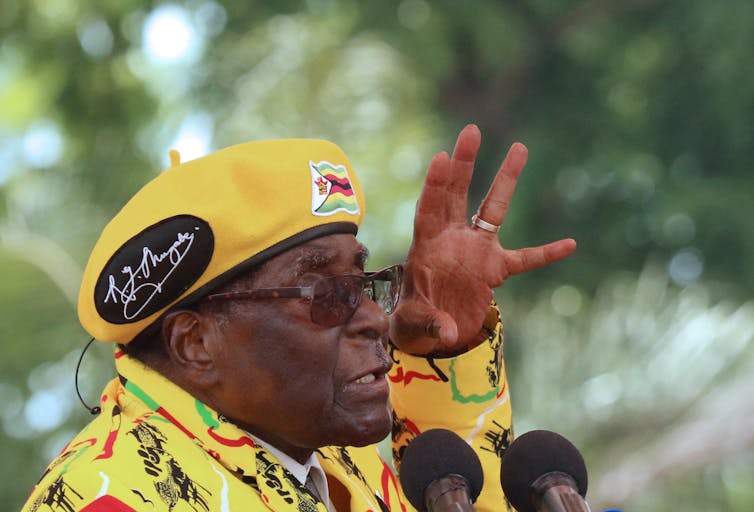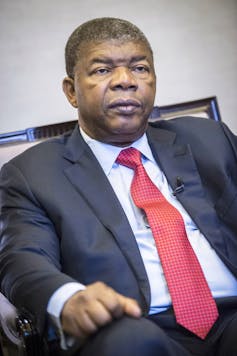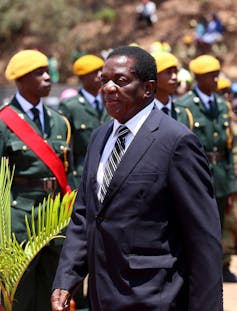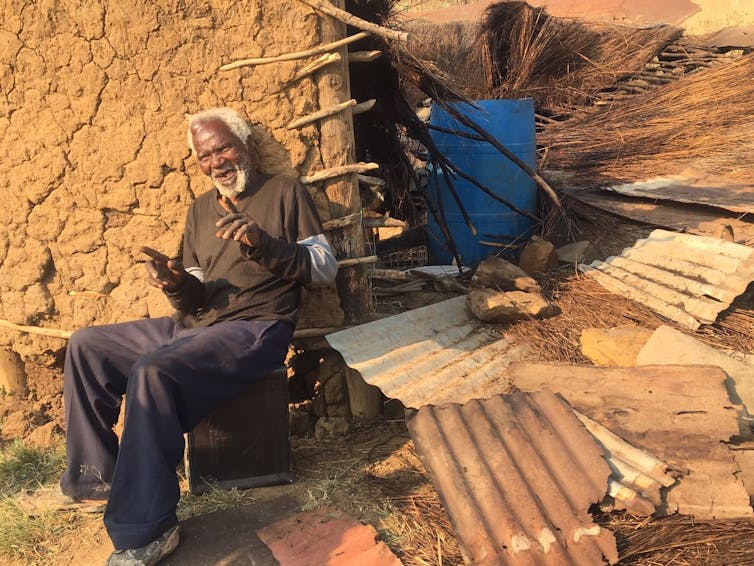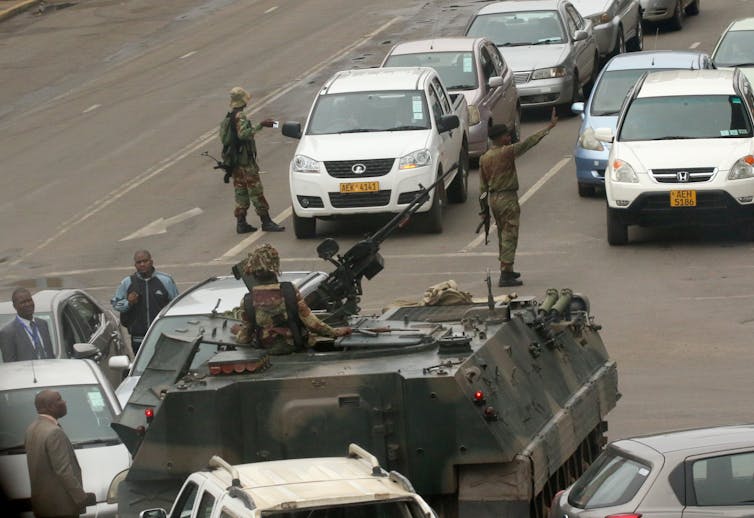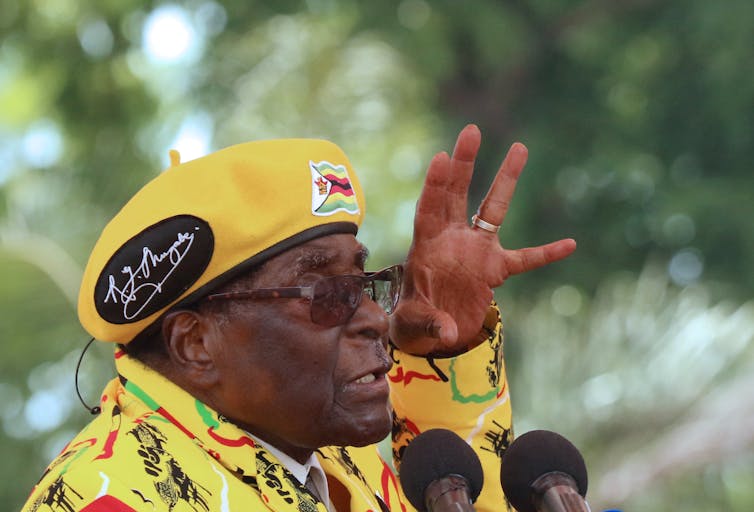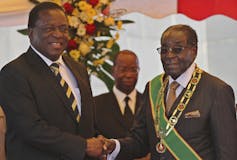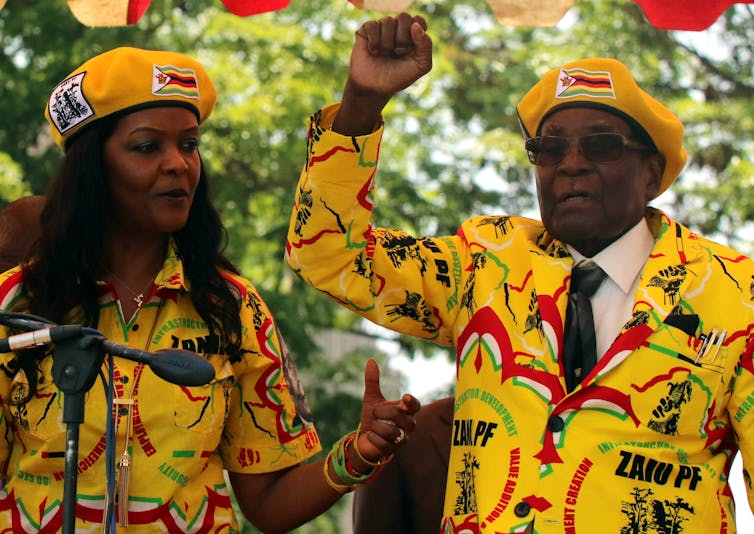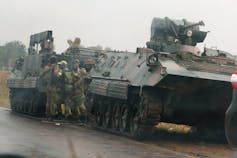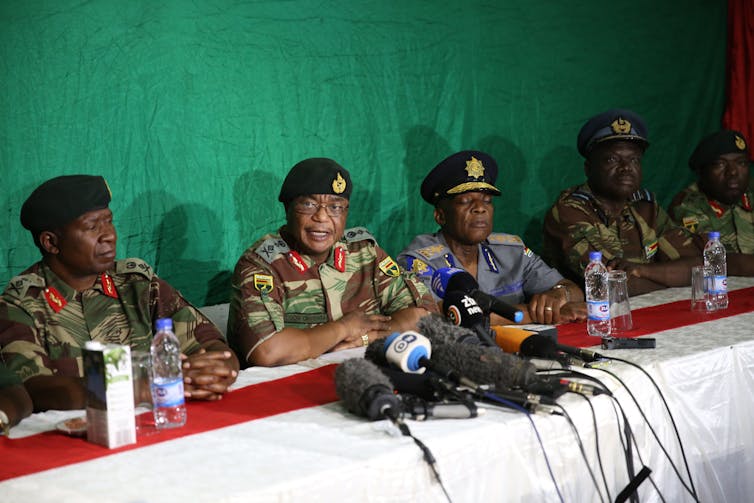
Zimbabwe National Army commander Constantino Chiwenga, second from left, addressing the media.
EPA-EFE/Aaron Ufumeli
November 2017 will go down in the history of Zimbabwe as the beginning of the end of Robert Mugabe’s 37 year tyranny. A tumultuous week finally culminated in his resignation on November 21st. One cannot understate the widespread jubilation at the demise of Mugabe and his desire to create a dynasty for himself through his wife Grace.
But the optimism is misplaced because it doesn’t deal directly with the dearth of democracy in Zimbabwe.
First, contrary to popular sentiment that the coup was meant to usher in a new era of political liberalisation and democracy, the takeover is actually meant to deal with a succession crisis in Zanu-PF. The military made this clear when it said that it was dealing with criminals around Mugabe. And the party’s secretary for legal affairs Patrick Chinamasa indicated that removing Mugabe from the party’s Central Committee was an internal party matter.
Secondly, I would argue that the military resorted to a “smart coup” only after its preferred candidate to succeed Mugabe, Emmerson Mnangagwa, was fired from the party and government.
The way in which the military has gone about executing its plan upends any conventional understanding of what constitutes a coup d'etat. It’s a “smart coup” in the sense that the military combined the frustrations of a restive population, internal party structures and international sympathy to remove a sitting president. It thereby gained legitimacy for an otherwise partisan and unconstitutional political act – toppling an elected government.
This begs the question: Is the military now intervening for the collective good or for its own interests?
Why the military intervened
It is baffling to imagine how the military has suddenly become the champion of democracy and regime change in Zimbabwe.
It’s clear that what motivated the military commanders was a fear of losing their jobs and influence after their preferred successor was purged. They launched a preemptive strike against Mugabe to safeguard their own selfish interests as a military class and the future of their careers.
Given the symbiotic relationship between the Zimbabwean military and the ruling Zanu-PF party, it was inevitable that the top commanders would be embroiled in the party’s succession crisis. After all, the military has been the key lever behind the power of both Mugabe and his ruling Zanu-PF since 1980.
In the past they have acted as part of the Zanu-PF machinery, openly campaigning for Mugabe alongside other security agencies.
And they have played a key role in neutralising political opponents. Back in the 1980s the military was responsible for the massacre of thousands of civilians and Zapu supporters in Matebeleland. More than two decades later in 2008 they were responsible for the torture, death and disappearance of 200 opposition activists and the maiming of hundreds more.
In addition, the UN has implicated Mnangagwa and the generals in the illegal plundering of resources in the Democratic Republic of the Congo. They have also been fingered in the disappearance of diamond revenues from Zimbabwe’s Marange diamond fields.
On top of this the military and Zanu-PF share a special relationship that has its roots in the liberation struggle. The Zimbabwe African National Union (Zanu) was the political wing of the Zimbabwe African National Liberation Army (Zanla) during the liberation war. They therefore have vested interests in the survival of the party.
After independence, the relationship remained intact as the military became the guarantors of the revolution. Some of the same surviving commanders of Zanla are still senior high ranking officials. The commanders are also bona fide members of the ruling party and guarantors of Zanu-PF power.
The same securocrats are also members of the Zimbabwe National Liberation War Veterans Association. This quasi paramilitary group is an auxiliary association of the ruling party and has fiercely opposed Mugabe’s attempt to create a dynasty.
Military must step aside
Zimbabwe goes to the polls next July to choose a new president and parliament. The elections – if conducted in a credible way – will provide the next government with the legitimacy it needs to take the country out of its political and economic crises.
Now that Mugabe has resigned the hope is that the military will allow a genuinely democratic transition to take place. All political players, including opposition parties, would need to be incorporated into a broad-based transitional authority pending credible elections.
But for the elections to be credible, the transitional authority would need urgently to reform the electoral system. This would ensure Zimbabweans can freely and fairly choose their leaders. Without this, peace and prosperity will continue to elude Zimbabwe.
Enock C. Mudzamiri, DLitt et DPhil Student in Politics, University of South Africa
This article was originally published on The Conversation.
